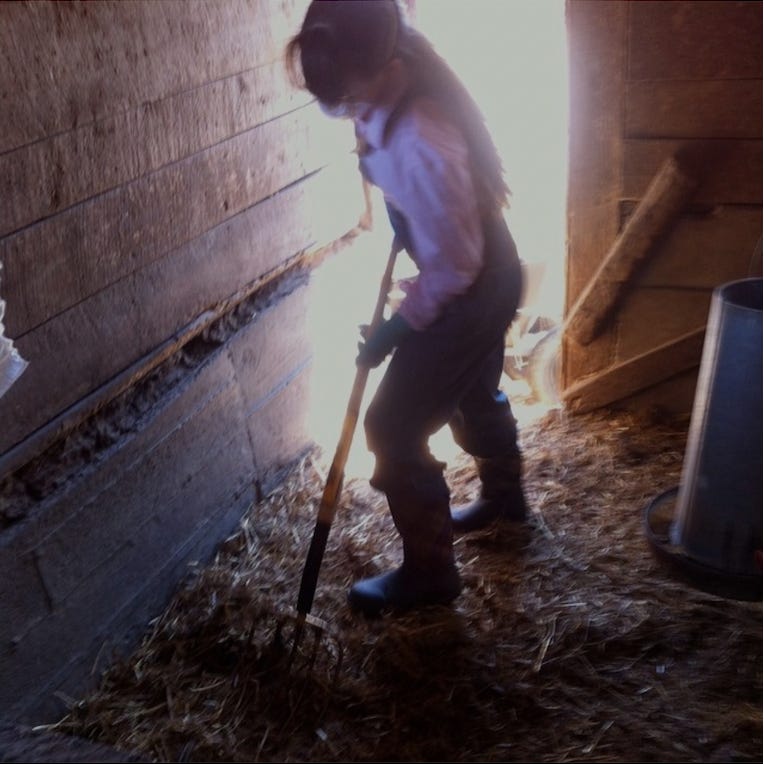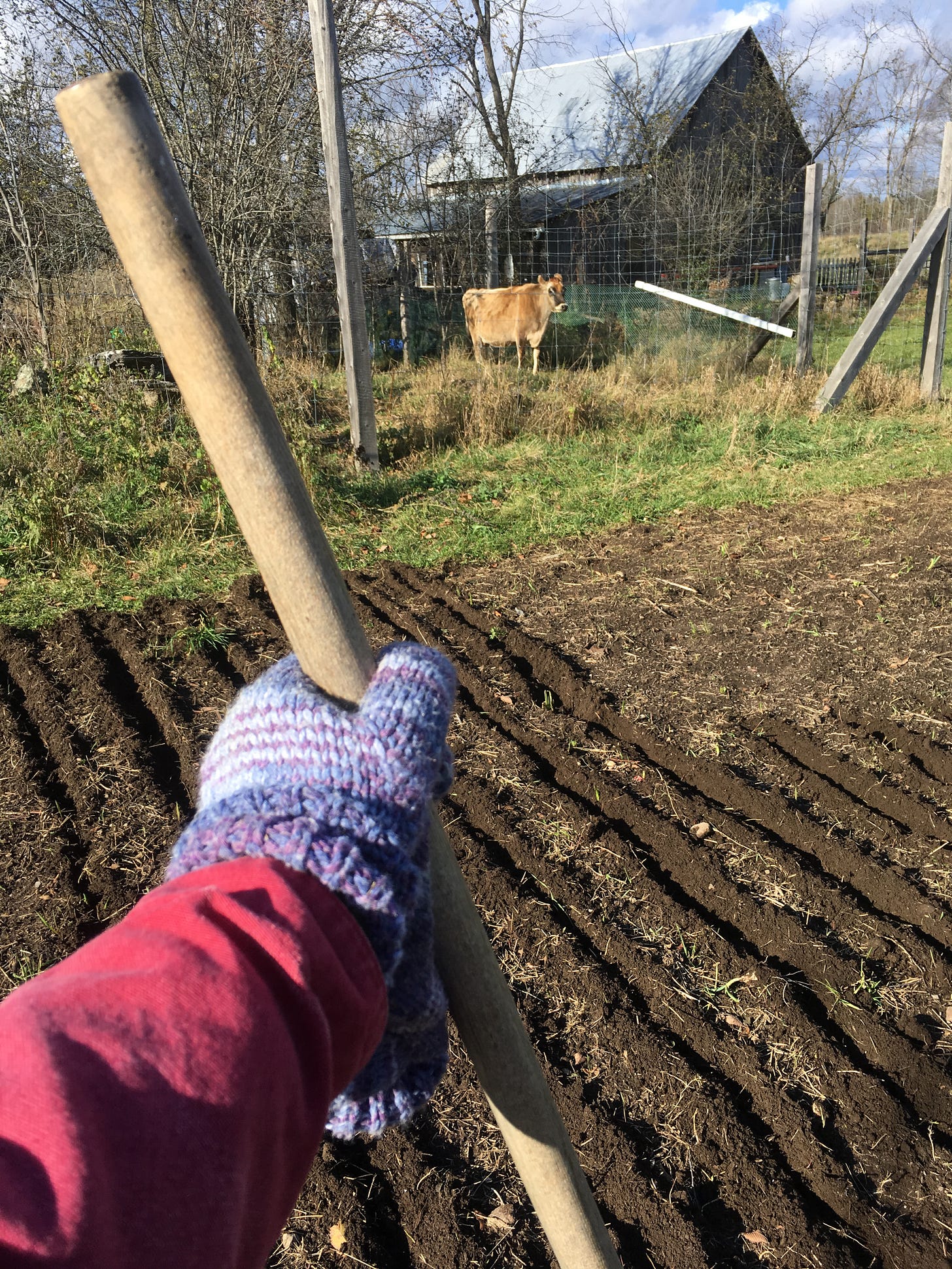Last week, my husband, our twenty six year old daughter, and I drove around a field all day gathering hay bales and stacking them on our old hay wagon. We did this until I, the hay stacker, stood high aloft the trailer on my tower of hay. Then, we drove the tractor back to our barn and unloaded it before starting all over again. It was an unforgiving, scorching hot day. We were covered in sweat and dirt and we were bone tired. But the hay waits for no one and so we returned, again and again, until there were no more bales to throw, stack, unload, carry, and stack back up again.
All the while, working in such extremes, I was thinking about how much I love working with my family. My husband is a beast, all strength and skill. It’s amazing to see how easily he can move or heave something that we mere mortals struggle with, but the best part is his attitude. He’s always patient. Always easy going. He can quickly take the feel of a group and shift the mood of drudgery to one lightened by his good nature. And give me any of my daughters to work with, side by side, over anyone else on earth. They are hard workers. Good workers. They are strong and diligent with their tasks. They don’t complain. They don’t stop. They understand the need to complete a task and they do it.
But how did that happen? I’ve had the displeasure of working with young people who disengage, sulk, or just plain leave the job at hand when it doesn’t please them. As much as we’d like to chalk these things up to personality or hope that when they grow up, they will learn to work, it just doesn’t work that way. To my husband and I, as parents, including our children in the work of our family was natural. We always had standards and expectations of our children. Our family was a cohesive unit and in such a structure, everyone contributes. Today, expectations are increasingly seen as some sort of injustice. We’ve taught young people that life is fulfilled when there is entertainment and ease. Comfort is right, strife is wrong. In our family, that was never our way.
Anyone that’s worked with our adult daughters has commented on their work ethic and we experience it for ourselves. That doesn’t mean they have been formed into good little soldiers, ready and able to work for the man. That’s not the point in teaching children how to work. It’s entirely antithetical to developing a work ethic in a child. What teaching children the joy and value in working means, is that they approach work with an inborn sense of pride and expectation of themselves and that, in turn, serves them in profound ways. Our adult daughters have created lives where they’re their own bosses. That allows them the flexibility to shape their worlds as they want to. If they weren’t good workers, able to just set themselves to a mission and accomplish it no matter the effort, they wouldn’t be able to create the lives they want rather than a life beholden to following the dreams and dictates of others.
“The soft bigotry of low expectations.”
- George W. Bush
I’ve heard that quote is attributable to George Bush. I wish it wasn’t. I wish it was coined by Aristotle or Pericles or Gandhi. But there it is, one of my favourite quotes and I have to give props to an un-cool guy who said something incredibly poignant.
“The soft bigotry of low expectations.” Wow. It’s the defining ethos of where we’ve arrived, where we’ve driven ourselves to. All around us, the construction of “harm reduction” spreads into every facet of our lives. What started as an approach to drug addiction has blown like old dandelions into every system and organization in society.
We cannot be so cruel as to hold high expectations of anyone - they are broken and scarred and to do so would only be unjustly harsh. We must meet them where they’re at. Jump in the hole with them and cover the light streaming in from the exit. That light is not hope, it is a unreahable temptress that they will never reach. Expect nothing. Trust that they’re all that they are and where they should be. That is kindness. That is love.
- upside down Tara, 2023
“In our time, political speech and writing are largely the defence of the indefensible… Thus political language has to consist largely of euphemism, question-begging and sheer cloudy vagueness… the great enemy of clear language is insincerity. Where there is a gap between one’s real and one’s declared aims, one turns as it were instinctively to long words and exhausted idioms…”
-George Orwell, 1984
This pervasive, toxic approach has found its way into sports teams - nobody keep score! We see it in schools - individualization is okay if one wants to claim an alternative gender or species as their own identity, but the expectations around quality of work, attendance, punctuality, exceptionality, and free thought are lowered to accommodate the lowest common denominator. It’s a belief that’s infiltrated into every nook and cranny of our modern world. But it’s in the home, in parenting, that I think this approach is most destructive.
I had a friend over last week. He’s a skilled tradesman and a wonderful, relaxed guy with a shy, but sly, sense of humour. His comments sometimes take a few moments to reach the right corner of my brain to decipher into something incredibly insightful or hilarious. The kind of guy that you want to have a beer with just to get him to tell you stories about growing up in his small village in Europe. He came to Canada less than a decade ago as a young man and started his own business as a skilled artisan that learned from masters in his hometown. He was telling me that in the last year he has fired eight young men that came to work as apprentices with him. “They just won’t work”, he said. “Half of them wanted to work two days a week. The others wanted a start time after 10:00.” Just that morning, on his way to our place, his latest hire texted him four minutes before he was due to be at work and said, “Can’t come in. 2 tired.” I was flabbergasted. He wasn’t surprised.
To that story I could ramble on with handfuls more. My dairy farmers who can’t find people to work at their farm. My electrician friend who, after years of trying, has given up and just cut back on jobs he takes. My favourite courier guy who always brings our dogs liver treats and chats with me for awhile who, looking particularly tired the other day, said he started work at 2:00 in the morning to sort the parcels before jumping in his truck at 8:00 and working a full day. When I asked why, he said it’s been like that “since covid” because “nobody wants to work”.

Maybe it’s a good thing that nobody wants to work in the sorting plants and the factories, but what’s the alternative? Is that because they’re out there hustling to create a new business or to develop a new idea, a new way of doing things that contributes to this beautiful world of ours? Or is it because they’re in their mother’s basement waiting for the universal basic income to roll in? Is it, at its core, because a lot of these young people have spent their lives being entertained, having nothing asked of them, that they see expectations and structures as unpalatable?
We need to let our children work. As much as we need to let them play (and I will be addressing that in an essay coming soon), we need to understand the value of letting them work. Asking them to work. We need to hold expectations for the things they haven’t yet achieved. We have to be okay with seeing more in them, with fostering potential without feeling like it diminishes who they are today. You can do both. How can we expect our children to grow into adults that have authentic confidence in themselves if we never trust them to handle what comes their way? We have to allow them to be challenged and to overcome. I see so many parents and teachers now applauding their children for the most menial of accomplishments and jumping in the moment there’s some struggle. If we don’t let our children struggle, how can they ever trust that they have the stuff they need to succeed?
When our children were small, toddler age even, we would do small tasks alongside them. We would clean up toys or books together. Back then there was usually a song attached to the task or we made games of it. As they aged they were responsible for setting and clearing the table. If they made a mess in the car, it was their job to look around and clear it out when we got home. Their dirty clothes went into their laundry hamper. Every task was, and should be, a relevant one. It teaches consequences to have to pick up all of your lego when you’re done playing. It teaches responsibility to clear plates off the table after your parents fed you beautiful food. They got to play a part in the roles of their family. Their contribution was necessary, meaningful, and expected. Children raised with these expectations take pride in the roles. And when they don’t? So what. The job remains. And maybe that’s the most important point of all. The job remains and it must be done. It’s not always fun, but the job remains.
Where does that happen anymore? Well, it happens in real life, that’s where. I know that if I don’t walk around my farm, collecting bushels of wild forages for my meat rabbits nobody is going to do it for me. They’ll live, but not be very healthy if I don’t do it. If they’re not very healthy, why am I raising them? What does that mean for us, the eaters of the “not very healthy”? I understand that not only is there a task before me that I need to do, whether I feel like it or not, but that if I don’t, there are normal and predictable consequences. That was a gift we were intent on allowing our children to experience in endless and varied ways. That can be tough on a parent and I think it’s why most would rather give in and soften the world for their kids. Only the real world is not going to soften itself. What happens then?

I was with some parents and their five year old daughter a few weeks ago. They’re wonderful, loving parents. Their daughter came upon a raspberry bush dripping in fat, perfectly ripe berries. I told her she could have as many as she wanted. But she didn’t want to pick them because of the “prickles” on the bush. Her dad showed her to just pick the berries, not bury her arms in the branches, but she resisted and asked him to pick them. He showed her how to pluck the berries off the bush, but she still resisted. She wanted the berries but wanted someone else to pick them for her. Her mom came over, picked a handful of berries and handed them to her. Victorious. But a great, simple, run of the mill, every day opportunity gone.
It’s innocent enough, but it’s also the type of consequences we were always cautious to reinforce and support. In that situation, our daughter would either pick her own berries or not eat any. At two years old that wouldn’t be the case. I hope that’s obvious. But as they age, we need to step back and allow our kids to be taught by more than our good intentions. Our children need to be uncomfortable and cry and be angry because they don’t get their way. And then they learn how to change those outcomes, sometimes simply by enduring something unpleasant or unwanted in the moment in service to something even better.
As parents, we have received endless praise and feedback on the work ethic of our daughters. Sports team coaches were all blown away with our kids (and I know I sound like I’m gloating, but it’s very true). Our adult friends who were everything from farmers to welders to physicians, and everything in between, have told us how impressed they are with our daughters’ work ethic. That’s a wonderful trait to share with people in your community. It’s a real ‘leg up’ to have other people want to collaborate and achieve things with you by their side. But even more importantly is how it has affected their self confidence. Authentic self confidence earned by facing strife, having to figure out ways over or around or through and accomplishing that goal no matter what. That’s where confidence comes from. It doesn’t come from clapping, “GOOD JOB!” every time your kid covers their nose when they sneeze.
We need to earn trust in ourselves. We need to earn confidence in our lives, every single one of us. Nobody can tell us what we are or what we’re capable of. Words slide off the human that is slicked with niceties but has no callouses. It will forever ring “untrue” until we earn it for ourselves.
Work should be meaningful. It should have a beginning and an end and a purpose lest we be cogs in an ever-grinding wheel. But what has meaning for one is very different than what has meaning for another. In teaching our children that work is good, that it has meaning, that it is valued in our family unit, we are setting them up for the big













